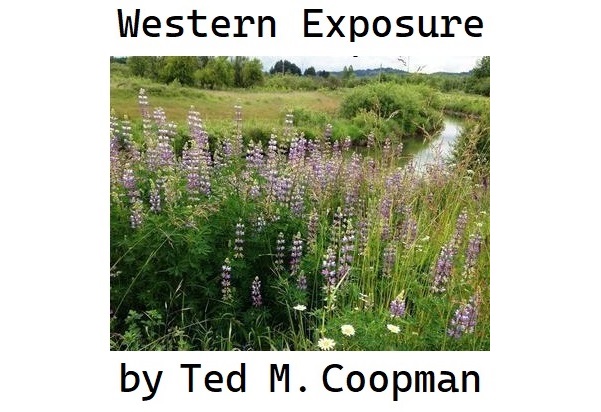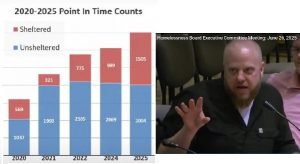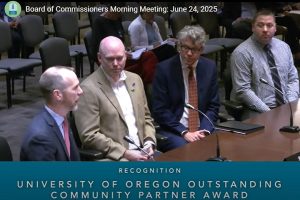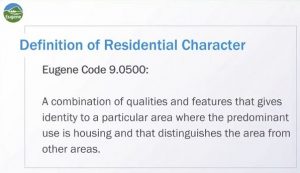The Grand Bargain on homelessness
7 min read
The idea of ‘the’ homeless versus the reality of homelessness, Part 2
by Ted M. Coopman
Right now, we have the worst of both possible worlds. We are spending millions of dollars to shelter unhoused people while spending millions of dollars—including private sector costs—on the impacts of people living in our streets and open spaces.
The federal courts are clear: You can’t sanction people for sheltering on public land unless they have some place to go. As I have argued, if we do not want public camping and all the resulting problems and expense, there is only one solution regardless of whether you feel compassion or disgust: safe, sanitary, sanctioned, managed campsites.
The system of nonprofit and government-sponsored safe sleep sites combined with all the wraparound services needed to deal with the mental health, substance abuse, and trauma is already very expensive and we would have to more than double our capacity to meet the need.
The difference is that shelters and treatment are productive costs, while the money spent on dealing with the impacts of street camping is simply lost. We are burning mass sums managing a problem that could be used to solve it.
The Grand Bargain
The bottom line is that taxpayers are going to have to cough up much more money than we want to adequately address the problem. Compassion is one thing, getting invoiced for it is something else. So, the Grand Bargain is what the 99% of people who are housed in Eugene get for our money. That significant sacrifice, absent our direct responsibility, is going to involve curtailing the choices for people without shelter so we can effectively eliminate urban camping.
In my opinion, the only way we can convince taxpayers to cough up the cash is to clear, and keep clear, our streets and open spaces.
As of 2023, we have three safe sleep sites for vehicles and tents, all of which are full, with waiting lists, and another two in development. This is in addition to a variety of Safe Spots, villages, and car campsites operated by nonprofits like Community Supported Shelters and St. Vincent De Paul. Homes for Good is also ramping up permanent shelter for the unhoused.
While the numbers are fudgy, Eugene has about 4,842 unhoused people based on Housing and Urban Development’s definition of homeless. Keep in mind that anyone not in permanent shelter, but in temporary shelter, is still considered homeless. Best guess is that about 2,000 people are without shelter in Eugene each night.
(I am not going to take a deep dive on the stats or costs, so to get a good grasp of the current scope of the effort, see the Homelessness in Lane County dashboard.)
As the amount of shelter space increases, the city council has moved to rein in street camping by tightening rules around water, wetlands, and educational facilities and increased penalties for willful violation. They have also moved to increase enforcement for RV and trailer camping in residential areas.
As any ride down the Fern Ridge bike path or walk in Wards 1, 7, or 8 will show you, this is all a work in progress.
The city of Eugene has also established a federal-grant-funded Community Court program to try and unravel the “toxic knot” of homelessness, minor offenses, and community safety impacts. It directs shelter and targeted support to certain unhoused individuals charged with misdemeanors like trespassing, disorderly conduct, criminal mischief, and other non-violent charges.
Rights vs. responsibilities
“Rights” are the benefits and the allowances that government owes to the people they govern. Rights are immutable unless changed by the courts or are “natural rights,” beyond any specific laws. For these rights to have meaning, they must be enforced or protected by authorities or broadly accepted as normative.
“Responsibilities” are the civil duties that each citizen is supposed to fulfill. These obligations are assigned or assumed, and responsibilities are “owed” by individuals to the larger society. Such responsibilities help make the city a peaceful and suitable place to live in and must be broadly accepted as normative to be effective. That is, no one is above or below the law.
The balancing of rights and responsibilities is required to ensure that all residents can live safely, in peace, with access to shelter and sanitation, secure in their possessions and property, able to conduct legal commerce, employment, and cultural and social activities, as well as the ability to use public spaces free of harassment.
Everyone has a responsibility to respect the rights, peace, property, and safety of others, and to care for and protect our collective commons. This balance is where we need to start a concerted effort to effectively eliminate unsanctioned public camping.
Living on the streets is unacceptable
Living on the streets in unsafe and unsanitary conditions is unacceptable. Period.
It is obvious why people should not be living outside of sanctioned shelter. It is dirty and dangerous and a blight on public space. It damages our environment, social fabric, culture, economy, and the ability to run a functional society. It is bad for everyone. It is not a viable choice, regardless of what any individual wants. It should not be tolerated, ever.
Expand and constrict
Expand the existing network of safe sleep sites. In the short term, this means greater efforts at extracting funding from the county, state, and federal governments that are responsible for housing and public health. If we have a clear plan on reaching functional zero, we can make the case for funds. Finding the balance of responsibility and compassion is key.
Fortunately, the state and federal government are finally waking up to the problem and we can seize momentum and go after funding (I am looking at you, Val Hoyle). The goal is to reach the capacity to shelter the enumerated homeless population.
While the federal courts have made it clear that people must have a shelter option available to them if they are denied use of public space, they do not require that people want or prefer the options provided, only that there are options. Sorry, but if you are indigent and require public resources to survive, it is not unreasonable to put conditions on it.
Constrict the spaces and acceptable behaviors of the unhoused. If living on the street has boundaries, it will make the limitations of living in a sanctioned site seem less onerous. The freedom to do whatever, wherever is an attractive option, so we need to remove it.
Honestly, I have had plenty of interactions with the self-declared “house-free” traveler crowd who are happy to live on our streets and off the fat of social services. There are also criminal vagrants who ply their trade in the urban wilds.
Everyone, rich or poor, must live within certain bounds and we need to set those limits on our fellow unhoused citizens. Show respect by demanding the same of them as anyone else. They are worthy humans and can handle it.
Camping vs. homesteading
The law and compassion require people to have the ability to shelter themselves. It does not require we allow the homesteading of public space. The city should clearly define transitory and persistent uses and forbid the latter.
A transitory use is setting up a shelter (tent) or parking a vehicle that is a shelter for a short period to allow for rest. One and done – one night – one location – 24 hours.
The ability to establish persistent camps allows for the accumulation of excess material, attracts crime, is a health and public safety hazard, damages the environment, and is expensive to mitigate. Camps like these would be persistent uses, defined as occupying the same space for over 24 hours.
The money spent on clean-up is better used in creating shelter and providing services. No one has a right to seize and hold—and thereby exclude others—from public space.
Re-establish meaningful deterrence
The trend to decriminalize so-called “minor” or “quality of life” crimes is an utter failure. Community Court is a great start but needs expanding along with restorative justice programs.
However, some people need a reason to stop doing something and that sometimes means jail.
Our public spaces and facilities are under direct sustained attack. These are not victimless crimes, but crimes against everyone. The penalties for the destruction of public property need to be expanded and enforced. Denying the use of public restrooms for those who need it is not a minor offense.
Those who are mentally ill or struggling with addiction
Obviously, there are limits to the expectations that can be placed on those who are mentally ill or struggling with addiction. But placing limitations on the rest of unhoused population should create a better overall environment on the street.
Ultimately, we need to have a serious conversation about what liberty and autonomy we are protecting by letting people suffer unto death on the streets. While forcing people into treatment is not optimal, letting them suffer and die is immoral. But that is a conversation for another day.
Ted M. Coopman serves on the Eugene Area Chamber of Commerce Business Leaders Task Force (BLTF) on homelessness on the Data and Accountability Committees. The BLTF launched in November 2021, engaging over 100 business leaders. Ted credits the Chamber for stepping up to get the city, county, and various agencies to agree on a single strategy: “We are making progress!“
Western Exposure is a semi-regular column that looks at issues and challenges from a West Eugene perspective – a perspective that is often ignored or trivialized by city leadership and influential groups and individuals largely based in south and east Eugene.
Western Exposure rejects the fauxgressive party line, performative politics, and “unicorn ranching” policy in favor of pragmatism focused on the daily experiences of residents and small businesses in Eugene—and West Eugene in particular.
Ted has been involved in neighborhood issues since 2016 as an elected board member, and now chair, of Jefferson Westside Neighbors and has 30+ years experience as an activist and community organizer. He earned a Ph.D. in Communication (University of Washington) and served on the faculty at San Jose State University from 2007 to 2020.
Ted’s research on social movements, activist use of technology, media law and policy, and online pedagogy has been published and presented internationally and he taught classes ranging from research methodology to global media systems. He and his spouse live in Jefferson Westside with an energetic coltriever and some very demanding and prolific fruit trees.





